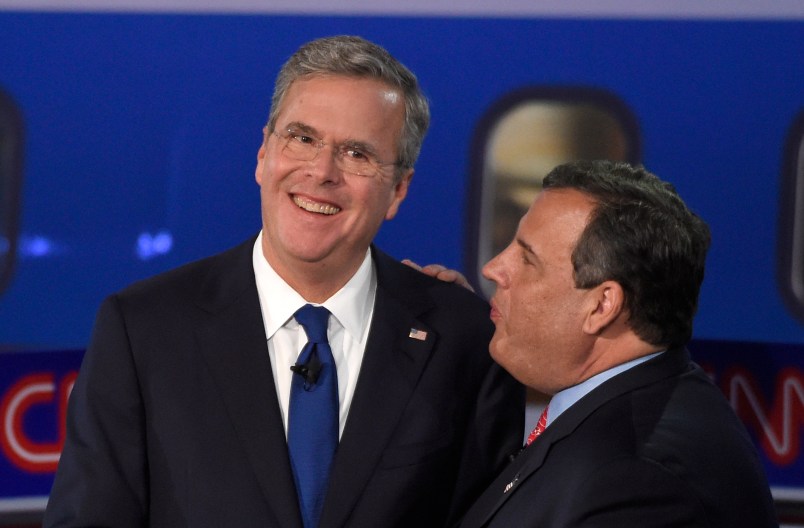Chris Christie, Marco Rubio, Jeb Bush and John Kasich are standing on the cusp of the Republican primary season with the same campaign strategy; hope their establishment competition drops out of this presidential race soon and count on their supporters to coalesce around you.
In a cycle where Donald Trump and Ted Cruz have amassed more than a majority of support in the polls at this point, the conventional wisdom emerging is that the only hope for victory is for the establishment lane to narrow.
It was the parting cry from Wisconsin Gov. Scott Walker when he dropped his bid for the White House way back in September. In order for his party to be competitive in the general election, Walker urged fellow candidates to drop out so that “voters can focus on a limited number of candidates who can offer a positive, conservative alternative to the current frontrunner” aka Donald Trump.
Lindsey Graham, another former 2016 establishment candidate, also told CNN after he dropped out of the race that “we’re going to have to start consolidating as Republicans” if the party has a chance at taking down Trump.
In her December column, Jennifer Rubin charged that of the establishment candidates “any one of them” could beat Trump or Cruz “but not if all remain in the race dividing the vote as Trump and Cruz compete for the far right.”
The conventional wisdom is so engrained in the GOP psyche that most of the establishment candidates over the last two months have devoted campaign ads and attack lines not at discrediting Trump or Cruz, but to tearing down one another.
Bush’s PAC is spending money to knock down Rubio and Christie even when Cruz is far ahead of each of those candidates. Rubio has his one-liners aimed at Bush, and Christie is mocking Rubio’s Senate attendance record on the campaign trail. All of this signals that the candidates are more worried about clearing the establishment lane than they are about actually trying to beat Trump at this point, which reveals just how vital they think it is that one establishment candidate rises to the top.
But even if the establishment finds itself with one candidate to rally around, there is no guarantee, experts say that voters will automatically move from one establishment candidate to another. It just doesn’t work that way.
“It’s absurd,” says Larry Sabato, a political science professor at the University of Virginia. “There is no such thing as supporters of one candidate moving en masse to another candidate even if we think it makes logical sense.”
That is because, Sabato says, voters don’t just cast ballots because they support a candidate’s position on immigration or the economy. Aside from a few hardcore policy wonks, most American voters support a candidate because they like them. They may like their demeanor, their approach to government or a host of other things that a simple poll cannot take into account.
“They are choosing among human beings not automatons,” Sabato says.
And when a voters’ first choice candidate drops out of the race, they don’t automatically support the next guy in line who ideologically matches them.
“Suppose Chris Christie emerged as the remaining candidate, he has a prickly personality. You either love him or you hate him,” Sabato says. “Not every establishment candidate supporter is going to go vote for him.”
A recent NBC poll examined what would happen if Rubio exited the race. What conventional wisdom would expect is that his support would flow to Bush or Kasich or maybe Christie. But instead, the poll found that if Rubio dropped out of the race, a plurality of his supporters would not siphon off to Christie, Bush or Kasich. Instead, 28 percent of them would actually support Cruz. And 9 percent of them would surprisingly support Trump who is glaringly different than Rubio on a polarizing issue like immigration. Rubio supports a path to legal status while Trump would like to round up 11 million immigrants and send them home.
A Public Policy Polling survey found if given just two choices, 60 percent of Republicans would vote for Trump and 29 percent would cast ballots for Bush, a sign that some establishment support might move to Bush if the other candidates dropped out, but hardly all of it. Trump would also get a boost from a Kasich, Rubio and Christie exit. Similarly, in another head-to-head matchup, 59 percent of Republican primary voters would support Cruz and only 26 percent would vote for Rubio.
Pollsters agree that Republican establishment candidates might stand a chance of doing better if the field was smaller, but it still is unlikely that it would be enough to overtake Trump or Cruz at this point.
“It is a problem for the Republican Party that there is no one dominant person but to add up all the establishment support and say that is more than what Trump is getting, goes beyond what is happening,” says Lee Miringoff, the director of the Marist Institute for Public Opinion.







There are GOP “moderates”? The only thing moderate about Bush or Rubio is their tone. The overwhelming majority of their policies are just as wing nutty as Cruz or Trump. Otherwise, solid article.
Just keep Jebya! away!! Thoroughly dislikable Cruz will flame on his own.
In fairness to the author, note that she carefully avoids the term ‘moderate’ in the text, referring instead to the ‘establishment’. My understanding is that headlines are typically written by someone else.
There have been no GOP “moderates” since Reagan purged them out of the party.
The GOP establishment is like a zombie that doesn’t know it is dead.